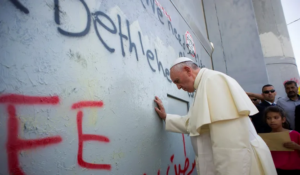Pope Francis and the Jews: a warm relationship strained by the war in Gaza

Pope Francis touching the West Bank separation barrier on his way to celebrate mass in Manger Square in Bethlehem in 2014
Anna Momigliano reports in Haaretz on 22 Apr 2025:
MILAN – When the late Pope Francis paid a state visit to Israel in 2014, Prime Minister Benjamin Netanyahu greeted him, noting that “Jesus was here, in this land. He spoke Hebrew.” The pontiff gently but firmly corrected him: “Aramaic.” That brief, playful exchange perhaps best encapsulated his relationship with the Jewish world: warm and friendly, yet brutally honest when necessary.
Francis, the first pope from outside of Europe, was a highly political head of the Roman Catholic church. The early years of his 12-year papacy were dominated by the migrant crisis in southern Europe, where he firmly sided with the migrants. His first overseas trip as pope, in 2013, was to Lampedusa, the small Italian island that became a destination for many asylum seekers – and, often, their lifeless bodies – trying to reach Europe from North Africa. Another motif of his papacy was respect for the environment, which was the central theme of his 2015 encyclical “Laudato si'” (“Praise Be to You”).
But in recent years, it was foreign affairs – specifically, the wars in Gaza and Ukraine – that dominated his politics. A staunch pacifist, Francis – who died Monday at age 88 – repeatedly urged both Kyiv and Moscow to negotiate a peace agreement. However, he caused a stir in March 2024 when he seemed to suggest that Ukraine should surrender: “I believe that the stronger one is the one who sees the situation, who thinks of the people, who has the courage of the white flag, to negotiate,” he said in an interview with a Swiss broadcaster.
Francis criticized Israel’s war in Gaza even more strongly, and did not shy away from suggesting it could be a genocide. “According to some experts, what is happening in Gaza has the characteristics of a genocide. It should be carefully investigated to determine whether it fits into the technical definition formulated by jurists and international bodies,” Francis wrote in his recent book “Hope Never Disappoints: Pilgrims Towards a Better World.”
After the October 7 Hamas attack, Francis met with both the families of Israeli hostages held in Gaza, former Israeli hostages and with Palestinians whose family members suffered from Israel’s military operations. He reportedly felt very close to the tiny Christian community in Gaza, telephoning them personally and often. In his final public address, on Easter Sunday, the pontiff called for a cease-fire in the Strip.
Francis’ strong stance on Gaza occasionally put him at odds with some leaders in Italy’s Jewish community, who have mostly supported Israel’s actions. After “Hope Never Disappoints” was published last year, the Assembly of Italian Rabbis criticized his above mentioned quote: “The words of the pope about the need to assess whether there is a genocide in Gaza may look prudent but can also be dangerous,” it said in a statement.
Earlier this year, Noemi Di Segni, the leader of the umbrella organization of Italy’s Jewish communities, said in an interview that the pope’s strong condemnation of Israel’s actions was “putting at risk the [Jewish-Catholic] dialogue.”
However, Francis will ultimately be remembered as a supporter of that Jewish-Catholic dialogue. He visited Rome’s main synagogue in 2016, where he was warmly greeted, and stressed several times that Jews were the “older brothers” of Catholics – echoing the words of a predecessor, Pope John Paul II. The same year, he published an exhortation on love that, among other things, made it easier for Catholics to marry Jews. He also repeatedly stated that Catholics should not try to convert Jews and restricted the recitation of a prayer that calls of the conversion of the Jews.
Indeed, when Francis passed away on Monday, all of the country’s major Jewish leaders were quick to express their condolences. The Assembly of Italian Rabbis praised his “sincere dialogue with the Jewish world.”
Di Segni thanked him for taking a stance against antisemitism, while Walker Meghnagi – head of the Jewish community in Milan – said the memory of Pope Francis’ “words in favor of the hostages and peace in the Middle East will remain in our hearts. Let’s hope peace will come as soon as possible.”
This article is reproduced in its entirety
